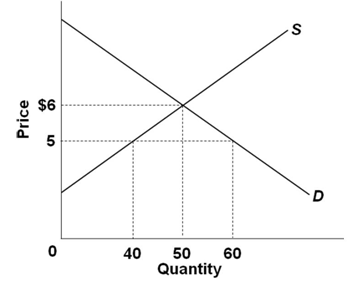The law of comparative advantage says that
a. the individual with the lowest opportunity cost of producing a particular good should produce it
b. comparative advantage exists only when one person has an absolute advantage in the production of two goods
c. whoever has a comparative advantage in producing a good also has an absolute advantage in producing that good
d. whoever has an absolute advantage in producing a good also has a comparative advantage in producing that good
e. gains from trade are possible only when one person has the comparative advantage in producing both goods
A
You might also like to view...
In the figure below, if the price of the product increases from $5 to $6, then total revenue would:

A. Increase by $300
B. Decrease by $100
C. Decrease by $300
D. Stay the same
Marginal product:
A. is always less than average product. B. may initially increase, then diminish, and ultimately become negative. C. may initially increase, then diminish, but never become negative. D. diminishes at all levels of production.